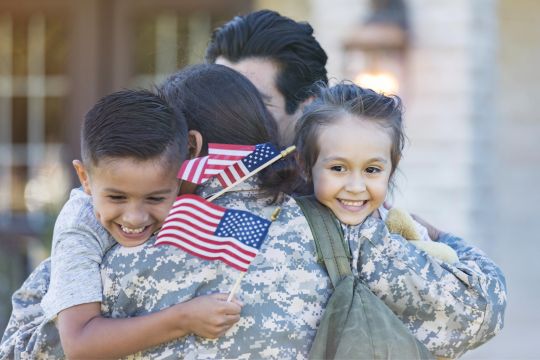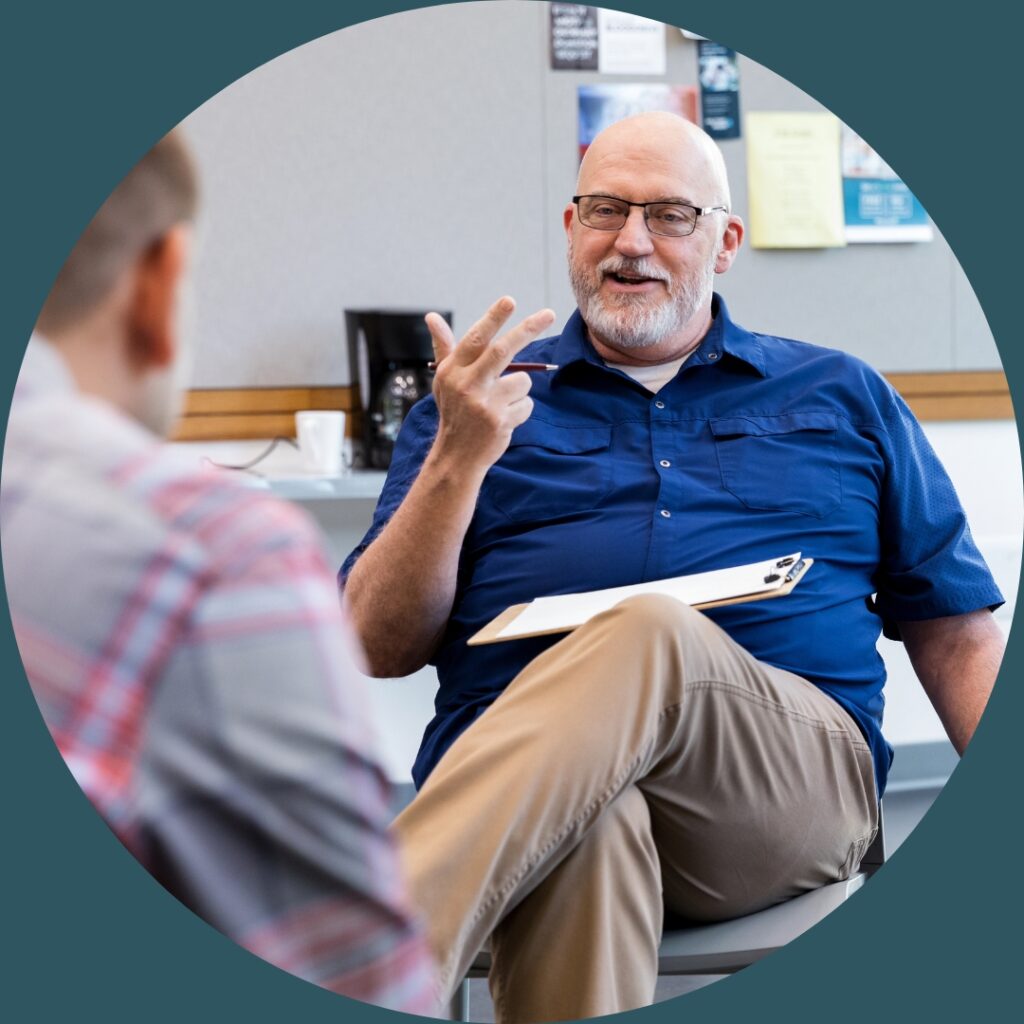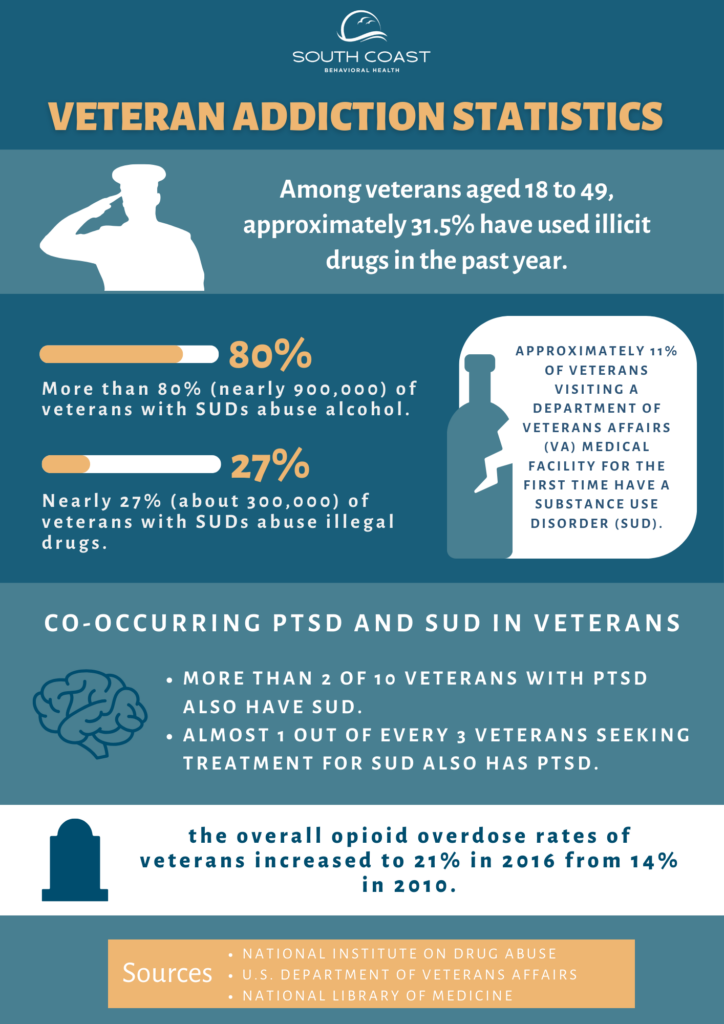Resources for Veterans and First Responders
Addiction is a difficult issue to cope with and veteran and first responder resources can provide vital support for those with loved ones who are in recovery. Learn more about South Coast’s veteran and first responder resources and how they can assist in recovery from substance abuse.
Resources for veterans and first responders help remove barriers to care for those who need help. Yet, many military personnel find it difficult to admit they have a problem and seek treatment. It is common for those who return from combat and other service to bottle up what they feel. They may believe they have to in order to remain “tough” and avoid the negative stigma of needing help. However, the result is great numbers of veterans and first responders self-medicating their pain with substances like drugs and alcohol. At first, these offer escape, euphoria, or some peace from anxiety. But before long, substances begin to take over. At this point, it’s much harder to hold everything inside.

Veterans, First Responders, and Substance Abuse
At first, substance abuse offers escape, euphoria, or some peace from anxiety. But before long, substances begin to take over. At this point, it’s much harder to hold everything inside. A person can’t hide their addiction from the ones who know them best. Unfortunately, the pain of trauma, addiction, and poor mental health hurts not just the individual but those around them. This is exactly why resources for veterans exist. The only way out of the toxic cycle of addiction is to get help from knowledgeable sources. Resources provide guidance, support, and actionable next steps for individuals, their families, and their friends.
Effective PTSD Treatment Trauma Recovery Resources for Veterans and First Responders
Trauma and PTSD treatment for veterans and first responders plays a pivotal role in addressing substance abuse issues. Effective treatment focuses on addressing the root cause of substance abuse by providing evidence-based and holistic therapy to address past traumas. By addressing their underlying trauma and PTSD, individuals can turn things around, leading to improved mental health and a higher likelihood of successful recovery from substance abuse disorders.
We are open 24 hours a day, 7 days a week, 365 days a year.
The Link Between Trauma and Addiction
There is a clear link between combat and other crisis services and substance abuse. Understandably, high-risk and high-pressure roles put a lot of stress on the individual. Many U.S. service members and first responders have difficulty separating their workday from their home life. Without a doubt, it can be difficult to “turn off” their training and fully relax. It’s especially challenging for deployed military who return to civilian life. Added into the mix is the fact that crisis workers will experience traumatic situations they can’t easily forget. With this in mind, it’s easy to see why high-risk workers commonly turn to drugs and alcohol to numb their pain.
Alcohol use disorder (AUD) is the most common addiction amongst veterans, including binge drinking, and abusing alcohol. Further, marijuana is the most-used illicit drug, followed by opioids. Markedly, veterans frequently battle chronic pain, and substances, including prescription painkillers, offer temporary relief. The cycle of numbing the pain can quickly accelerate into addiction. Those with combat experience, where they’re exposed to trauma from violence, are statistically more likely to engage in dangerous substance use patterns.
Veterans, First Responders, and Mental Health
Mental disorders are also connected to substance abuse, as well as to crisis work like that of veterans and first responders. Over time, the tension of having to stay on guard in high-risk scenarios takes a negative toll. Veterans often suffer with their psychological well-being and relationships. Overall, there are common mental health concerns surrounding veterans due to the isolating, dangerous, and traumatic nature of their work. These include:
- Post-traumatic stress disorder (PTSD)
- Traumatic brain injury (TBI)
- Depression
- Anxiety disorders
- Dysregulated anger
- Violence and mood shifts
- Suicide
First responders PTSD and depression are the most spoken-about mental health problems, but any symptoms can damage lives. Mental disorders and symptoms of poor mental health affect not just the individual, but their family and loved ones, too. On the whole, service members can experience isolation and a sense of otherness. Grief, flashbacks, and survivor’s guilt are also prevalent symptoms. Due to the perilous and sometimes confidential requirements of their jobs, they may feel trapped in their experiences.
Treatment for veterans’ mental health is important because it allows the individual to open up and share their struggles. Subsequently, by talking through their trauma, they unpack their feelings and begin to heal from their pain.
Addiction Resources for Veterans and First Responders
Substance abuse in veterans and first responders is serious. As shown, it can negatively change your life in areas like your mental health, relationships, finances, or perception of your future. If you think you have an addiction issue, or see signs of one in someone you know, you need help. The first thing to do is explore your options. However, it can feel overwhelming to know where to look.
Beginning treatment in a facility for addiction like South Coast Behavioral Health is a great option. Knowledgeable staff will walk you through every step of recovery to help you reach holistic wellness. But as you prepare, these resources for veterans and first responders are invaluable tools. They provide guidance, information, helplines, and next steps.
Mental Health Resources for Veterans and First Responders
With mental illness being so tied to substance abuse, as well as to deployment and crisis work, resources matter. Having access to first responder treatment for mental health is the difference between sickness and recovery. Many veterans returning from combat experience both mental and emotional wounds. Given that, they need support to process their trauma and smoothly reintegrate back into normal life. Additionally, veterans and crisis workers may have comorbid disorders, such as mental illness and substance abuse. These issues exacerbate each other, so resources that address the individual’s whole situation are important.
All in all, veterans and crisis workers deserve quality help and support to guide them through their pain. They put themselves at risk to serve others. Pain and trauma that turn into poor health and addiction shouldn’t be something they have to deal with. South Coast is here to help all veterans who are struggling find relief and support through treatment.
Where Else Can Veterans and First Responders Go for Help?
One of the biggest stresses around addiction and mental illness is not knowing how to proceed. Individuals may want to get better but are hesitant to seek help, or simply don’t know where to go. As such, resources for veterans and first responders are invaluable in the process of starting recovery.
Resources can only take one so far. Eventually, they’re going to need to receive addiction treatment from a professional treatment center. Recovery facilities help individuals reach sobriety with detoxification. They have around-the-clock staff monitoring and supporting them. After detox, clients in treatment engage in a mixture of therapy and counseling to unpack their unresolved trauma from service. They learn greater self-awareness, like why they turn to drugs and alcohol. Further, they prepare for the future and set goals for both their recovery and return to civilian life.


Veteran and First Responder Resources at South Coast
Some treatment centers offer specialized treatment programs for veterans and first responders. At South Coast Behavioral Health, we offer a Valor Program for U.S. service members and first responders. It targets the needs of this population with trauma-informed care, counseling, medication assistance, and planning for a return to civilian life. Our treatment program focuses on holistic care because we know healing can’t happen if there are unaddressed issues.
- Reducing the severity of PTSD and trauma symptoms
- Learning coping strategies to deal with triggers
- Improved relationships with family and friends
- Building a network of support to reduce isolation
- Overall improved quality of life
Veterans need a treatment program where they can receive help for their comorbid issues and experience whole mind-body healing. We would love to answer your questions about addiction recovery for veterans. Please reach out today and let us help you move forward.
Get A Confidential Assessment From A Recovery Specialist
Our Addiction Treatment Centers in California
Our network of California treatment centers can help veterans and first responders overcome trauma and PTSD safely and effectively. Our process involves the latest and greatest evidence-based and holistic practices for a well-rounded approach to recovery.
Irvine, CA
We provide treatment for drug and alcohol use disorders within our medical detox and residential treatment centers in Irvine, CA.
Huntington Beach, CA
We provide addiction treatment services for women within our medical detox and residential treatment centers in Huntington Beach, CA.
We provide addiction treatment for men within our residential inpatient facility in Costa Mesa, CA.
We provide care for men and women in recovery from substance abuse within our PHP and IOP treatment facility in Newport Beach, CA.
Our caring staff of recovery professionals is available 24/7 to assist in the recovery process. Call us today at 866-881-1184 for more information about how we can help veterans and first responders with recovery.


